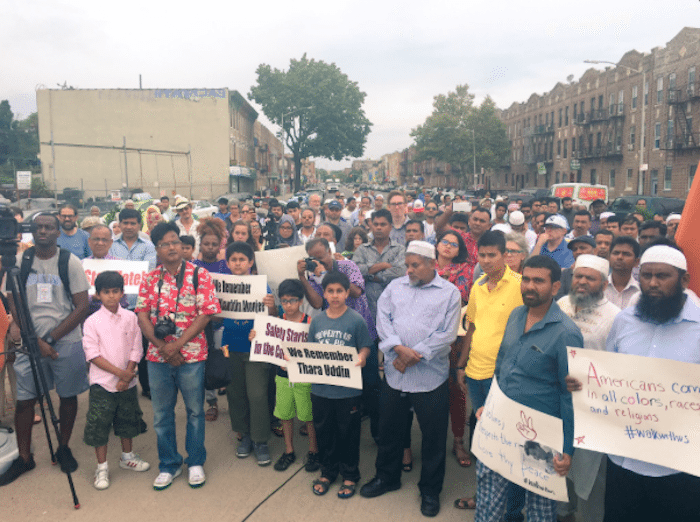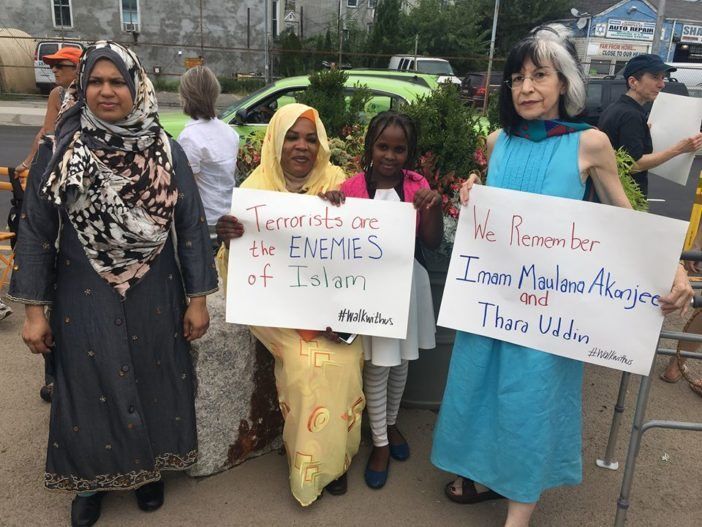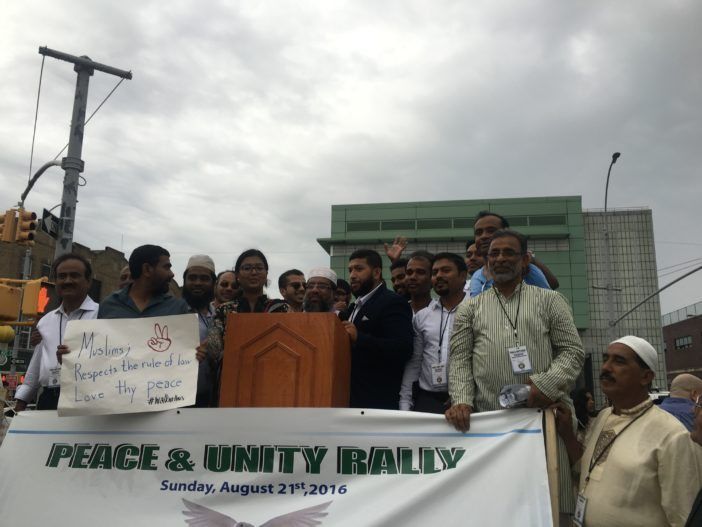Kensington Mosques & Residents Unite Against Islamophobia


Hundreds gathered on Sunday at Kensington’s Avenue C plaza, at the first event to unite local Mosques in recent history. At the Peace and Unity Rally, neighbors, religious leaders, politicians and Bangladeshi community leaders demanded religious peace and justice for the killing of Imam Alauddin Akonjee and Thara Uddin, who were gunned down in Queens on August 13.
Days after standing for peace on Coney Island Avenue, Kensington leaders, including Mamnun Haq, Mian Quandry and Shahana Hanif, spoke out against Islamophobia and discrimination; demanding a full investigation into the killing and voicing peace between the the Latino and Bangladeshi communities.
“There is a lot of murmur in the media that the Latinos and Bangladeshis have problems, but we are trying to clear that,” co-organizer Mamnun Haq told DPC. “Bangladeshi immigrants live together with many nationalities in Kensington and Ozone Park, which are both diverse communities.”
The rally was also a physical act of unity for Kensington Muslims. According to Hanif and Quandry, this was the first time that the four local mosques — Bangladesh Muslim Center & Islamic School, Baitul Jannah Jame Masjid & Muslim Community Center, Darul Jannah Masjid & Islamic Center, and Brooklyn Islamic Center — joined forces to publicly address islamophobia and its impact on the neighborhood.
“One of the things that kept coming up from first generation Bangladeshi-Americans is: Who are our leaders, who speaks to the press and what is our message? The mosques have a variety of analysis, so how do we come to an agreement. And what do we do when our Muslim brothers and sisters are targeted,” said Hanif.
But the people who came out to Sunday’s rally were bound together as one community, speckled with diverse religious, racial, gender and cultural representation.
“We are sad and shocked and angry. Killing an Imam is not an isolated thing, it affects the whole Muslim community and all New Yorkers. And many different people came out to show their solidarity,” said co-organizer Mamnun Haq.

Many politicians and candidates spoke at the rally, including Council Member Brad Lander, Boro President Eric Adams, New York State Assemblyman Dov Hikind, Community Board 12 member Barry Spitzer, candidates for Assembly District 44 Troy Odendhal and Robert Carroll, many religious leaders including Imams and Rabbis, and two Bangladeshi-American women activists, Hasiba Haq and Shahana Hanif.
“It is always important to stand up to violence and hatred. At this moment, I believe it is especially important to combat Islamophobia, and to show our Muslim neighbors – in Kensington, and around the city – that they are a welcome and essential part of the diversity that NYC is built on,” wrote Council Member Brad Lander.
Haq urged the Bangladeshi community to build partnerships with the police by attending precinct meetings, and and engage with their rights by attending community board and school meetings, and voting in local elections. “As an American you have rights, and you have to participate,” he told the crowd.
But a call for police engagement comes with a complex history in the Muslim community. Shahana Hanif, who led the rally as the MC, took the platform to speak her mind on a stage dominated by men. She said:
Since the attack, I have been especially thinking about Kensington — a neighborhood which houses four masjids within this intersection and in walking vicinity. Our mosques are our safe houses; they are, for many, a second home in the neighborhood. No one should feel unsafe entering or leaving their home.
On behalf of myself and the support of women’s empowerment groups I am involved in including The Bangladeshi Historical Memory Project, Andolan: Organizing South Asian Workers, and Naree Shonghothok: A Bangladeshi Women’s Organizing Collective, we demand justice for the families — that this attack against the Muslim community is investigated as a hate crime.
We demand safety for our diverse Muslim communities and their mosques in NYC. I am not asking for the addition of more cops or policing nor modes of surveillance that may entrap and criminalize our own Muslim sisters and brothers. We need the support of our police precinct without the adversarial impacts. We want safety measures in place to protect us from the consequences of Islamophobia.
We acknowledge that Islamophobic rhetoric impacts Muslims across the gender spectrum – our sisters’ voices and presence in this fight for systemic change are as important. We also don’t want this event to be used to pit us against the working class Latino community. This is the time to actually come together as working class immigrant communities and bridge ways to support and understand one another.
Representing Muslim women at this event was important to Hanif, who grew up in a mosque, learning Arabic and reading the Qur’an, but only up to a certain age. “I wanted to ensure that the rally wasn’t just a replica of other male dominated events,” Hanif told us. “If you look at the elected officials who spoke, most of them were men. I had to take that power and call to be represented; so the community itself has space to talk and breathe and feel out what was happening.”

“It was daunting to be on stage as a woman, but it was empowering. It was eye opening, in the masses of men, the community of elected officials talking and taking up space, to have a woman MC and sharing my thoughts in a bold way. My framework has to do with my love for the community and the immense pressure on Muslims, in a time of Trump and rampant islamophobia pre- and post-9/11.“
Bangladeshi & Kensington sis @HShahana femme’cing & speaking at peace & unity rally in Bk. #walkwithus pic.twitter.com/UbLMGAzJTT
— Hasiba Haq (@HasibaHaq) August 21, 2016
Co-organizer Mian Quadry feels a dual identity with New York and Bangladesh, and was deeply affected by the violence that tore through the center of both places. “I’m a community servant. I was born and raised in Bangladesh and am a byproduct of New York culture since the mid-80s,” said Quadry. “When the news broke that the Imam was shot — doing his service the community and mosque — it hit me hard. It was so vicious. I contacted the Bangladesh Muslim Community Center and said ‘this is a wake up call.’
Hanif echoed this urgent call for action. “A murder in tight-knit communities like those the Bangladeshi Muslim and other immigrant enclaves is devastating and paralyzing, but it only means we keep strengthening our commitment to their survival,” Hanif said to the crowd. “Our Islam teaches us to protect one another, and inshAllah, we will continue to stand against racism and Islamophobia.”



